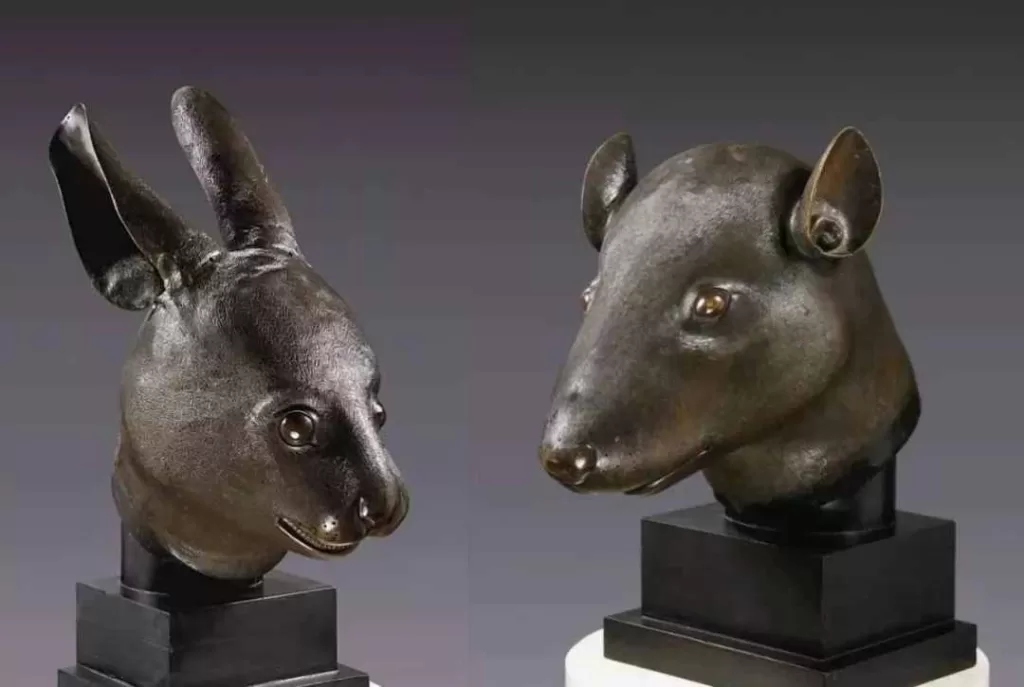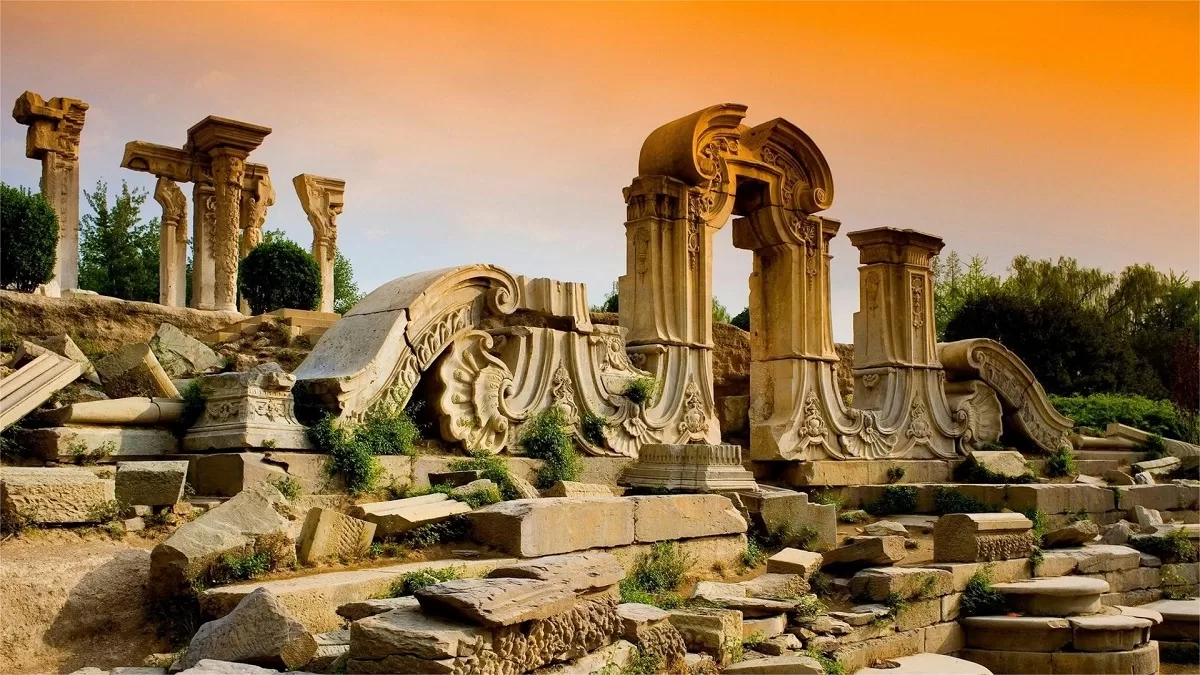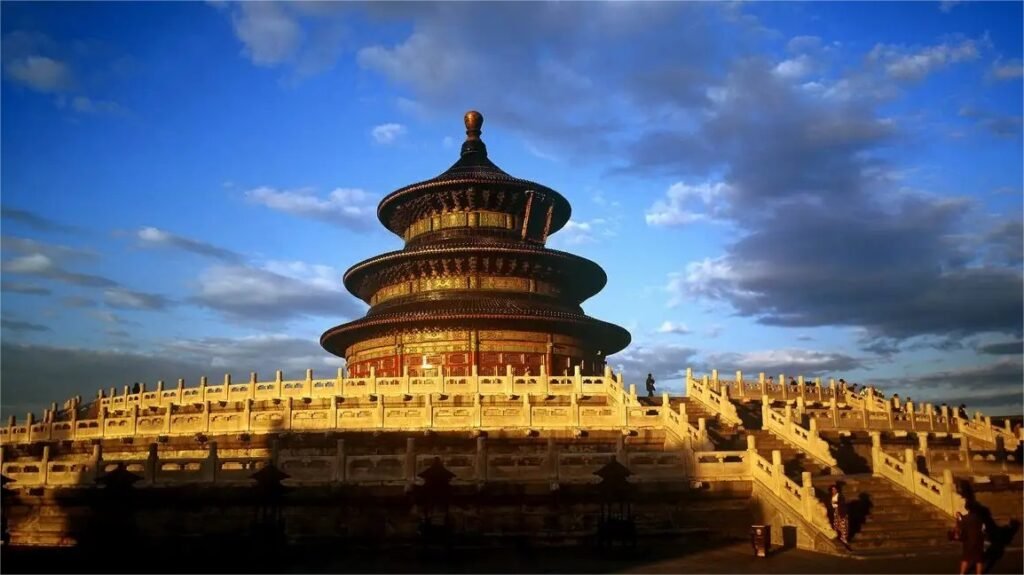The Old Summer Palace, also known as Yuanmingyuan (圆明园), was an imperial palace complex located in Beijing, China. Built during the Qing Dynasty in the 18th and 19th centuries, it was known for its stunning architecture and extensive gardens.
The Old Summer Palace consisted of several sections, including the Garden of Perfect Brightness, the Western Mansions, and the Eastern Mansions. The Garden of Perfect Brightness was the centerpiece of the complex and featured numerous lakes, pavilions, and gardens designed to resemble famous landscapes from around China.
Over the years, the palace complex was expanded and renovated by various emperors, and it eventually became one of the largest and most impressive imperial palaces in the world. However, in 1860, during the Second Opium War, the palace was ransacked and burned to the ground by British and French troops.
Today, the Old Summer Palace is considered a national treasure and an important historical site in China. While much of the palace was destroyed during the war, many ruins and fragments remain, providing a glimpse into the grandeur and beauty of the palace complex in its heyday.
Table of Contents
- Basic Information
- Location and Transportation
- Highlights of Old Summer Palace
- Map and Recommended Routes
- Vlog about Old Summer Palace
- Best Time to Visit Old Summer Palace
- Recommended Potography Spots
- History of the Old Summer Palace
- Zodiac Heads at the Old Summer Palace
- Useful Tips Summarized from Reviews
- Other Imperial Places in Beijing
- Explore Beijing Like A Local
Basic Information
| Website | http://www.yuanmingyuanpark.cn/ |
| Estimated Length of Tour | Over 3 hours |
| Ticket Price | Admission to the park: 10 yuan Site of European Palaces Scenic Area (Including Dashuifa, the Exhibition Hall, and the Labyrinth): 15 yuan Model Exhibition of Yuanmingyuan during its Flouring Period: 10 yuan Combined Ticket: 25 yuan |
| Opening Hours | 6.00 – 21.00; Last admssion: 19.00 (1st April – 31st October) 6.30 – 19.30; Last admission: 17.30 (1st November – 31st March) |
| Telephone Number | 0086-010-82539566 0086-010-62628501 |
Location and Transportation
The Old Summer Palace is in the Haidian District of Beijing, China, about 8 kilometers northwest of the Forbidden City, the former imperial palace of China, and covers an area of approximately 350 hectares. It is near the Summer Palace and is easily accessible by public transportation such as buses and the subway.
Bus:
Take bus No. 129, 331, 424, 432, 438, 508, 579, 601, or 664, get off at Yuanmingyuan Nanmen Stop (South Gate of the Old Summer Palace), and walk about 100 meters to the west to reach the south entrance.
Take bus No. 305, 320, 365, 375, 424, 432, 614, 664, 681, or 982, get off at Yuanmingyuan Dongmen Stop, and walk about 200 hundred meters to the south to reach the east entrance.
Subway:
Take subway line 4, get off at Yuanmingyuan Station, get out of the station from exit B, and you will find the ticket box right in front of you.
Highlights of Old Summer Palace
Magnificent Gardens

The gardens in the Old Summer Palace are renowned for their stunning beauty and elegance. They feature numerous lakes, hills, bridges, and pavilions, all carefully arranged to create a harmonious and peaceful environment. Visitors can also see exotic plants and trees, including rare species imported from other countries. The gardens incorporate elements of both Chinese and Western styles, with European-style buildings and sculptures blending seamlessly with traditional Chinese architecture.
Unique Architectural Style

The architectural style of the Old Summer Palace is a unique blend of Chinese and Western influences, creating a distinctive aesthetic. The palace complex features traditional Chinese elements such as courtyards, pavilions, and pagodas, combined with Western-style mansions and gardens. The European-style buildings feature columns, arches, and decorative embellishments, showcasing the emperor’s appreciation of Western culture. It is a reflection of the imperial court’s desire to showcase China’s rich cultural heritage while embracing the modern world.
Bronze Sculptures

The Old Summer Palace is famous for its numerous bronze sculptures, which were created by Italian artists commissioned by the Emperor. These sculptures depict mythological creatures and characters from Chinese folklore, showcasing the Emperor’s appreciation of art and culture. The sculptures are masterpieces of artistic and cultural exchange between China and Europe, combining Western techniques with traditional Chinese motifs. They are a testament to the palace’s cultural significance and artistic achievements, representing a unique blend of Chinese and European styles.
Cultural Significance

The Old Summer Palace was a fusion of Chinese and Western art, architecture, and culture, reflecting the emperor’s appreciation of both traditions. Its exquisite gardens, bronze sculptures, and European-style buildings showcased China’s rich cultural heritage and its ability to blend traditional and modern design elements. It was also a symbol of imperial power and the importance of cultural diplomacy. Despite the palace’s destruction, its ruins remain an important cultural site and a reminder of China’s resilience and commitment to preserving its cultural heritage.
Gardens Within the Old Summer Palace
Changchun Garden
Construction of Changchun Garden, also known as the Eastern Garden, began in 1745. In 1767, it absorbed Xichun Garden (also known as Qinghua Garden), and in 1769, Spring and Peace Garden was incorporated and renamed Qichun Garden, commonly referred to as the Southern Garden.
Qichun Garden
The original Qichun Garden, initially known as Aohui Garden, was constructed during the Kangxi period. Though specific records of its construction are scarce, it is believed to have been built around 1687. Midway through the Qianlong period, the garden was renamed Spring and Peace Garden and later incorporated into the Old Summer Palace as Qichun Garden in 1769. Subsequent expansions included constructing a grand entrance and additional buildings, solidifying its integration into the larger garden complex.
Western-Style Buildings in Changchun Garden
The Western-style buildings, or Xiyanglou, were a notable addition during Qianlong’s reign, commencing in 1747. By 1753, the first Western-style structure, “Xieqiqu,” was completed. Over the next few years, additional structures like “Birdcage,” “Haiyantang,” “Fangwaiguan,” and “Dashuifa” were added, showcasing a blend of Chinese and Western architectural styles.
Map and Recommended Routes

Most Efficient Highlights Route – 2.5 hours:
East Gate ➡️ Ruins of the Western Mansions ➡️ Boat or Sightseeing Car ➡️ Dock or Three Gardens Intersection ➡️ South Gate
Complete Highlights Route – 3 hours:
East Gate ➡️ Black Swan Viewing Area ➡️ Panorama Sand Table ➡️ Ruins of the Western Mansions ➡️ Boat or Sightseeing Car ➡️ Dock or Three Gardens Intersection ➡️ South Gate ➡️ Zhengjue Temple
Walking Tour Route – 3 hours
Enter at Zhengjue Temple ➡️ Hanqiu Pavilion ➡️ Three Gardens Intersection ➡️ Ginkgo Avenue ➡️ Ruins of the Western Mansions ➡️ Black Swan Viewing Area ➡️ Panorama Sand Table ➡️ East Gate
Time-Pressed Route -1 hour
East Gate ➡️ Lion Forest Garden ➡️ Ruins of the Western Mansions ➡️ East Gate
Vlog about Old Summer Palace
Best Time to Visit Old Summer Palace
Spring: In spring, the Old Summer Palace bursts into life with the revival of nature. The gardens are adorned with blooming flowers such as peach blossoms, apricot blossoms, and February orchids, creating picturesque scenes that beautifully complement the ancient architecture. Black swans dance gracefully on the lake, adding a lively and dynamic touch to the serene spring landscape.
Summer: Summer is the prime time for lotus viewing at the Old Summer Palace, which boasts extensive lotus plantations with diverse varieties. Visitors can take boat rides on the lake to enjoy the beauty of the lotus flowers up close. The lush trees provide ample shade, making it a perfect place to escape the summer heat and enjoy a leisurely stroll or boat ride.
Autumn: In autumn, the foliage in the Old Summer Palace transforms into a vibrant tapestry of golden and fiery red hues, creating a stunning contrast with the historical buildings. The Ginkgo Avenue is a highlight during this season, with golden ginkgo leaves carpeting the pathways, offering a breathtaking visual feast for visitors.
Winter: Winter cloaks the Old Summer Palace in a serene blanket of snow, creating a tranquil and peaceful atmosphere. While it lacks the bustling vibrancy of the other three seasons, the winter scenery has its own unique charm. The lake may be bare of lotus flowers, but the standing remnants of withered lotus stems exude a quiet beauty. The snow-covered landscape and the stillness of the surroundings provide a perfect setting for contemplative walks and appreciating the historical grandeur in a different light.
Recommended Potography Spots
Dashuifa Ruins: This iconic spot offers a classic backdrop for photography. The beauty of the partially destroyed structures showcases a unique charm that captivates the essence of historical decay and resilience.
Huanghua Labyrinth: This maze is both fun to explore and perfect for photos. The pavilion within the labyrinth provides a picturesque subject that enhances the overall composition of your shots.
Long Corridor and Ancient Trees: The winding corridor surrounded by ancient trees adds a sense of historical depth to your photos. The interplay of the architectural details with the natural setting creates a timeless feel.
Boating on the Lake: Whether capturing boats on the water or taking photos from within a boat, the sunlight reflecting off the lake enhances the beauty of your images. The serene waters and scenic surroundings make for stunning pictures.
Sunset Glow: The Old Summer Palace bathed in the soft glow of the evening sun offers a unique and captivating beauty. The warm hues of the sunset provide a perfect backdrop for capturing the historical grandeur in a different light.
History of the Old Summer Palace
Early Stage of the Old Summer Palace
The roots of the Old Summer Palace, also known as Yuanmingyuan, trace back to the Liao Dynasty when emperors built the Jade Spring Hill Palace (Yuquan Shan Xinggong) in the western suburbs of Beijing. This laid the foundation for the future significance of the area as a site for imperial gardens.
During the Ming Dynasty, high-ranking officials and nobility recognized the potential of the western suburbs of Beijing and began to construct private villas and gardens there. In the Wanli period of the Ming Dynasty, a notable figure, Li Wei, the Marquis of Wu Qing, initiated the construction of Qinghua Garden, which became known as the “No. 1 Garden in the Capital” and was located outside the west wall of present-day Peking University. Following this, another influential person, Mi Wanzhong, directed water from Qinghua Garden to create “Shaoyuan,” meaning “a scoop of water from Haidian,” east of Qinghua Garden.
Emperors of the Qing Dynasty were equally captivated by the potential of the western suburbs for garden construction. They embarked on large-scale projects, leading to the creation of the extensive and magnificent gardens that comprised the Old Summer Palace.
Construction and Expansion
The primary construction of the Old Summer Palace took place during the late Kangxi and Yongzheng periods. In 1707, Kangxi Emperor gifted a garden located about one mile north of Changchun Garden in the northwest suburbs of Beijing to his fourth son, Aisin Gioro Yinzhen. This garden became the core of the future Old Summer Palace.
In 1724, the second year of Yongzheng’s reign, the official expansion of the Old Summer Palace began. The Inner Court was instructed to dispatch personnel to the Rehe (Jehol) hunting grounds to procure timber for the garden’s construction. Subsequently, most of the timber used in the construction of the Old Summer Palace, the Western Garden, and the “Three Mountains and Five Gardens” came from this area. By 1725, the third year of Yongzheng’s reign, merchants were tasked with sourcing the necessary stone materials for the garden, underscoring the emperor’s urgency to complete the project.
The expansion during Yongzheng’s reign consisted of three main components:
- Extending the Central Axis Southward: This included building the palace area in the south of the originally gifted garden, strictly mirroring the central symmetry of the Forbidden City, including a new Grand Palace Gate and surrounding structures.
- Expanding the Original Garden: Extending north, east, and west, creating winding waterways and adding pavilions, kiosks, and other structures, forming the primary components of the “Forty Scenes” inscribed by Qianlong Emperor (33 of which were completed during Yongzheng’s reign).
- Constructing Fuhai: A large lake and surrounding structures were built, contributing significantly to the garden’s landscape.
By the end of Yongzheng’s reign, the Old Summer Palace covered about 3,000 acres, featuring a diverse array of architectural styles, including grand palaces and delicate pavilions, integrated with artificial hills, lakes, and meandering streams.
Qianlong Emperor further enhanced the Old Summer Palace, adjusting the landscape, adding new architectural groups, and constructing the neighboring gardens of Changchun and Qichun (later renamed Wanchun). The three gardens collectively became known as the “Three Gardens of Yuanming.” In 1744, the “Forty Scenes” of the Old Summer Palace were completed, marking the garden’s pinnacle of beauty and sophistication.
Destruction and Resoration
In 1860, during the Second Opium War, Anglo-French forces invaded Beijing and targeted the Old Summer Palace. On October 6, they breached the palace, and after two days of looting, set it ablaze on October 18. The once magnificent palace and its extensive collection of treasures and cultural relics were reduced to ashes.
During the Tongzhi period, attempts were made to restore parts of the Old Summer Palace for Empress Dowager Cixi’s residence. However, these efforts were short-lived due to financial constraints, halting after less than ten months. Subsequent foreign invasions, notably the Boxer Rebellion in 1900, further devastated the ruins. Looters and warlords scavenged the site for building materials, reducing the once grand palace to a shell of its former glory.
Protection and Preservation
The early Republic period saw continued degradation, with warlords and scavengers stripping the ruins of valuable materials. Some remnants found their way into public spaces, such as the Yanjing University and Beijing Library.
After the establishment of the People’s Republic of China in 1949, efforts to protect and restore the Old Summer Palace gained momentum. In 1951, the Beijing municipal government prohibited the removal of stones from the site. Extensive reforestation and land reclamation projects were undertaken, and by the 1980s, the area had been designated as a heritage site, with plans to develop it into a historical park.
In 1976, the Yuanmingyuan Administrative Office was established to oversee the site’s preservation. Subsequent decades saw significant efforts to stabilize and restore what remained of the palace, focusing on areas like Changchun Garden and the Xiyanglou ruins. Today, the Old Summer Palace stands as a poignant reminder of China’s cultural heritage and a symbol of resilience amidst historical adversity.
Zodiac Heads at the Old Summer Palace
The Zodiac Heads in the Old Summer Palace, also known as the Animal Heads, are a set of twelve bronze sculptures representing the animals of the Chinese zodiac. The heads were originally part of a larger fountain clock built in the 18th century by Jesuit missionaries for the Qianlong Emperor of the Qing Dynasty.
Each of the twelve zodiac animals – rat, ox, tiger, rabbit, dragon, snake, horse, goat, monkey, rooster, dog, and pig – is represented by a beautifully crafted bronze head. The heads are approximately 1.5 meters tall and weigh around 300 kilograms each. The intricate detailing on each head is remarkable, with each animal depicted in a lifelike pose and expression.
The Zodiac Heads were originally installed in the Old Summer Palace, located in the northwestern suburbs of Beijing, which was built during the reign of the Qianlong Emperor as a retreat for the imperial family. The palace was known for its stunning gardens, lakes, and pavilions, which were designed to blend harmoniously with the natural landscape.
In 1860, during the Second Opium War, British and French troops looted and burned the Old Summer Palace, destroying many of the buildings and artworks within. The Zodiac Heads were among the treasures taken from the palace, and their whereabouts were unknown for many years.
In 2000, a private collector in France purchased the rat and rabbit heads at auction. Their sale sparked controversy and calls for their return to China, as many viewed the heads as important cultural artifacts. The Chinese government launched a campaign to recover the remaining heads, and in the years since, several have been located and returned to China.
Today, seven of the twelve Zodiac Heads are housed in the Poly Art Museum in Beijing, while the other five are in Taiwan, France, the United States, and the United Kingdom. Despite their separation, the Zodiac Heads remain an important symbol of Chinese culture and a reminder of the Old Summer Palace’s storied past.
Useful Tips Summarized from Reviews
Skip the Panorama Model Exhibition Ticket: It’s advised not to purchase tickets for the Panorama Model Exhibition. The exhibition only consists of a large model, and you’ll likely exit within a couple of minutes.
Bring Water and Snacks: It’s recommended to bring water and snacks or food when entering. If the weather is cool, consider bringing some filling snacks, while in hot weather, fruits can be refreshing. The Old Summer Palace is vast, and taking breaks for a picnic can be enjoyable.
Proximity to Other Attractions: The South Gate exit is close to Tsinghua University, just a short walk away. Additionally, the Summer Palace and Peking University are nearby as well. It’s suggested to plan a visit to these attractions on the same day for convenience.
Boat Ride Recommendation: Taking a boat ride is highly recommended. The area is expansive, and a boat ride provides a unique experience. The ticket price is around 35 RMB per person. The boat will stop on the west side of the Western Mansions area, and walking eastward allows you to explore the entire area before exiting from the East Gate.






When you arrive at Yuanmingyuan Station by subway, take exit B and enter the Yuanmingyuan Museum from the Zhenjuesi. The most worth-seeing Horse Head of Yuanmingyuan is located here. Currently, there are 7 animal heads returned, with only the Horse Head preserved in Yuanmingyuan, and the other 6 animal heads are replicas, with authentic pieces being either at the National Museum or at the Poly Art Museum. In addition, the museum also exhibits relics excavated from Yuanmingyuan and overseas-return pillars,… Read more »